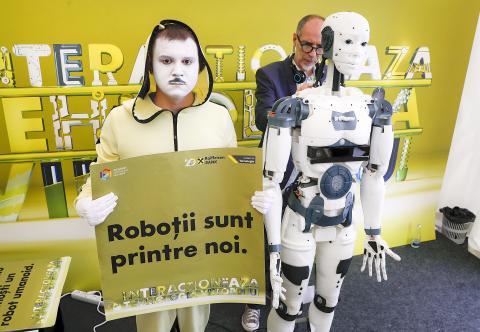Japan and Germany might be sitting on a ticking demographic time bomb where aging populations begin to drag down economic growth. Good thing they are also prime candidates for robot revolutions.
Increased automation and more use of robotic technology in these manufacturing powerhouses could help cushion the impact, according to Moody’s Investors Service.
“To the extent that robots can undertake activity that require labor, they will compensate for the negative impact that a slower growth in labor force would have otherwise had on growth,” Moody’s analysts wrote in the report this month.

Photo: AP
Dependency ratios — the share of those older than 65 years of the total population — are projected to soar in both Germany and Japan. However, these countries have two things going for them. Manufacturing exports in Germany, Europe’s largest economy, already make up more than a third of GDP; in Japan that stands at 12 percent. They are also both early robot adopters.
About three-quarters of total global sales of industrial robotics machinery are concentrated in five countries: China, Japan, the US, South Korea and Germany, with adoption concentrated in the automotive and electronics sectors. Among these, the three Asian countries bought about half of global industrial robots since 2013, led by China, Moody’s says.
At a time when some politicians are playing up concerns that globalization is killing domestic employment, robotics could lead to the return of some jobs that were outsourced to lower labor-cost destinations.
However, the number of jobs that would return would be less compared with the livelihoods lost previously, Moody’s said in the report.
Emerging market countries could be the losers. Countries such as Hungary, the Czech Republic and Slovakia where exports of high-tech manufacturing goods account for more than 50 percent of GDP — 16 percent to 20 percent of which go to Germany alone — could be at risk. Low-wage countries such as India and Indonesia would also face challenging times.
“In addition, manufacturing processes could also move to other production centers that are better equipped to absorb the new technology and can compete in the supply of high-tech products,” the report says. “In either case, some emerging market economies may lose export-market share because the new technology could change modes of production and trade patterns.”

NOT JUSTIFIED: The bank’s governor said there would only be a rate cut if inflation falls below 1.5% and economic conditions deteriorate, which have not been detected The central bank yesterday kept its key interest rates unchanged for a fifth consecutive quarter, aligning with market expectations, while slightly lowering its inflation outlook amid signs of cooling price pressures. The move came after the US Federal Reserve held rates steady overnight, despite pressure from US President Donald Trump to cut borrowing costs. Central bank board members unanimously voted to maintain the discount rate at 2 percent, the secured loan rate at 2.375 percent and the overnight lending rate at 4.25 percent. “We consider the policy decision appropriate, although it suggests tightening leaning after factoring in slackening inflation and stable GDP growth,”

DIVIDED VIEWS: Although the Fed agreed on holding rates steady, some officials see no rate cuts for this year, while 10 policymakers foresee two or more cuts There are a lot of unknowns about the outlook for the economy and interest rates, but US Federal Reserve Chair Jerome Powell signaled at least one thing seems certain: Higher prices are coming. Fed policymakers voted unanimously to hold interest rates steady at a range of 4.25 percent to 4.50 percent for a fourth straight meeting on Wednesday, as they await clarity on whether tariffs would leave a one-time or more lasting mark on inflation. Powell said it is still unclear how much of the bill would fall on the shoulders of consumers, but he expects to learn more about tariffs

Greek tourism student Katerina quit within a month of starting work at a five-star hotel in Halkidiki, one of the country’s top destinations, because she said conditions were so dire. Beyond the bad pay, the 22-year-old said that her working and living conditions were “miserable and unacceptable.” Millions holiday in Greece every year, but its vital tourism industry is finding it harder and harder to recruit Greeks to look after them. “I was asked to work in any department of the hotel where there was a need, from service to cleaning,” said Katerina, a tourism and marketing student, who would

i Gasoline and diesel prices at fuel stations are this week to rise NT$0.1 per liter, as tensions in the Middle East pushed crude oil prices higher last week, CPC Corp, Taiwan (台灣中油) and Formosa Petrochemical Corp (台塑石化) said yesterday. International crude oil prices last week rose for the third consecutive week due to an escalating conflict between Israel and Iran, as the market is concerned that the situation in the Middle East might affect crude oil supply, CPC and Formosa said in separate statements. Front-month Brent crude oil futures — the international oil benchmark — rose 3.75 percent to settle at US$77.01